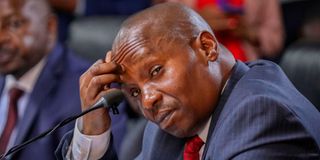State to lease passport printing machines from private investors, says Kithure Kindiki

Interior and Administration of National Government Cabinet Secretary Kithure Kindiki when he appeared before the Regional Integration Committee at Continental House in Nairobi on August 24, 2023.
The government now wants to lease high-capacity passport printing machines from private investors to help clear a huge backlog due to faulty machines.
Interior Cabinet Secretary Kithure Kindiki told Parliament that the leasing arrangement will mirror the medical equipment leasing arrangement that the Ministry of Health had.
“Their capital cost is very high and we will have to rely on some private sector funding through leasing without compromising on security,” the CS said.
Prof Kindiki told MPs that the government is looking at hosting the documents and government data, even as it moves towards leasing the machines from private investors. He said the machines, once leased, will be housed at the Government Printer and operated by State officials.
“We will manage the equipment once it is delivered. Private investors will only provide the equipment and we will enter into a lease-to-own arrangement or leases with specific timelines as is the case with leased medical equipment,” Prof Kindiki said.
Recoup their investment
He added: “The private investors can recoup their investment over time. So we will ensure that we take care of our national security without again being unable to provide the service because the resources required to transform Kenya’s issuance of security documents to meet world standards are huge.”
Prof Kindiki's comments come amid an outcry from Kenyans who have been waiting for more than eight months for passports to be issued after one of the machines broke down in March. There is a backlog of 58,000 passports.
Appearing before the National Assembly’s Committee on Regional Integration, Prof Kindiki told MPs that the country’s passport printing machines were “archaic and belong in museums”.
“It is possible that we lease the passport printing machines but we will ensure that the work is done by us at the Government Printer because the Government Printer is well established at the moment,” said Prof Kindiki, adding that the machines that print official documents, passports and IDs, are “totally dysfunctional and dilapidated”.
“I agree with the need for leasing. We still have a backlog of passports... We are printing about 5,000 plus a day; 2,500 during the day and 2,500 at night,” said Prof Kindiki.
The CS explained that part of the problem was that the Department of Immigration is not allowed to spend its internally generated revenue. He said that the department generates a lot of revenue for the National Treasury but it has no money to buy even a Sh100 million printer.
Increasing capacity
“Yet they’re producing close to Sh20 billion a year. The Treasury has allowed them to use their appropriation-in-aid (AIA) and we are increasing capacity,” he said.
“And I believe that when I make my next public accountability statement in a month’s time, there will be no backlog of passports,” he said.
According to the CS, passports should be issued within 21 days of application, but this would be reduced to seven days and eventually three days in a year’s time with the acquisition of new machines.
The number of passports processed and issued increased by 55.9 per cent to 426,137 in 2022 after the government lifted restrictions imposed to curb the spread of the coronavirus in early 2020.





